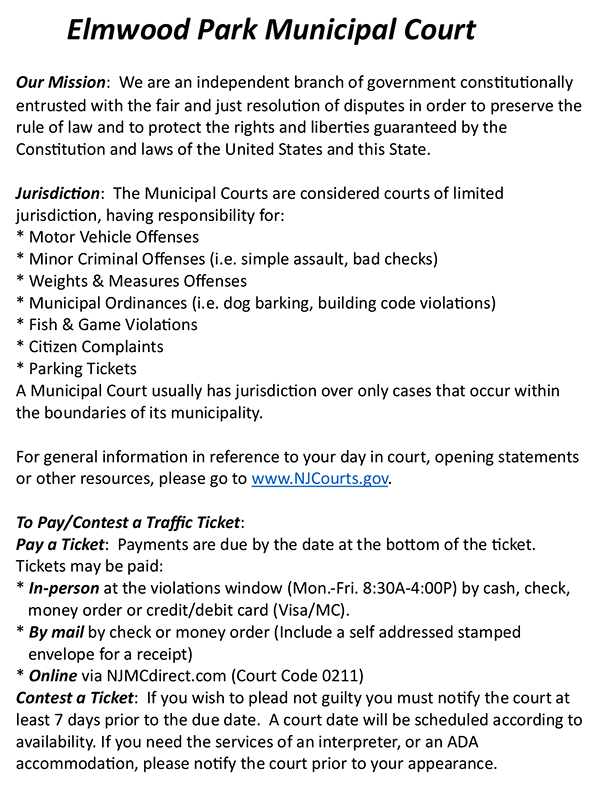Hon. Giuseppe Randazzo, JMC
Court Administrator
Deborah Zafonte, CMCA
This email address is being protected from spambots. You need JavaScript enabled to view it.
Deputy Court Administrator
Enida Ciftja, DCA
This email address is being protected from spambots. You need JavaScript enabled to view it.
Violations Clerk
Jo Lana Benzacar, VC
This email address is being protected from spambots. You need JavaScript enabled to view it.
Phone: 201-796-1457 x8801
Fax: 201-796-8132
Emergencies: Dial 911
Location:182 Market Street
Elmwood Park, NJ 07407
Hours:
Monday-Thursday 8:30am -4:30pm and Fridays 8:30am-3:00pm
Court Sessions:
Every Tuesday 1:00P

Links for FAQ:
Plea by Mail: https://www.njcourts.gov/forms/10715_plea_mail.pdf?c=uQC
Your Day in Court: https://njcourts.gov/forms/10959_yourdayincourt_8x11.pdf?c=vbt
Opening Statement: https://www.youtube.watch?y=y_zJg-XLde0
Do I qualify for a Public Defender: https://njcourts.gov/courts/assets/municipal/indigencyguidelines.pdf?c=KRC
Where may I pay my fine: www.NJMCdirect.com
Municipal Court Appeal Form: https://www.njcourts.gov/forms/10559_muni_appeal_kit.pdf?c=QQ0
Court Fines: https://www.njcourts.gov/attorneys/assets/directives/dir_15_20.pdf?c=aNi
NJMVC Point Schedule: http://www.state.nj.us/mvc/Violations/penalties_pointSchedule.htm
Records Request Application: https://www.njcourts.gov/selfhelp/index.html
Many municipal court sessions are being conducted virtually/remotely to minimize exposure to COVID-19. Accordingly, all complainants, defendants, attorneys, victims are to contact the municipal court at 201-796-1457 x8801 at least 7 days prior to your scheduled court date to provide your full name, e-mail address, and cell phone number. You will receive a Zoom link approximately 5 days prior to your court date.
*Please note if your case involves a consequence of magnitude (i.e. license revocation, high fine, jail time), you may be eligible for an in-person court session. Additionally, if you are having technical issues or lack the proper equipment to participate in a virtual format, kindly reach out to the court and we will place you on an in-person calendar.
Refer to the Borough website for any unplanned closures. In said event, your case will be relisted automatically.




